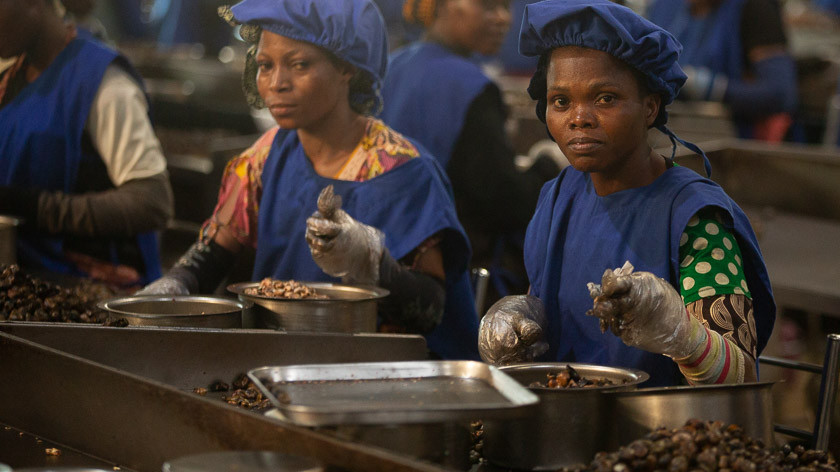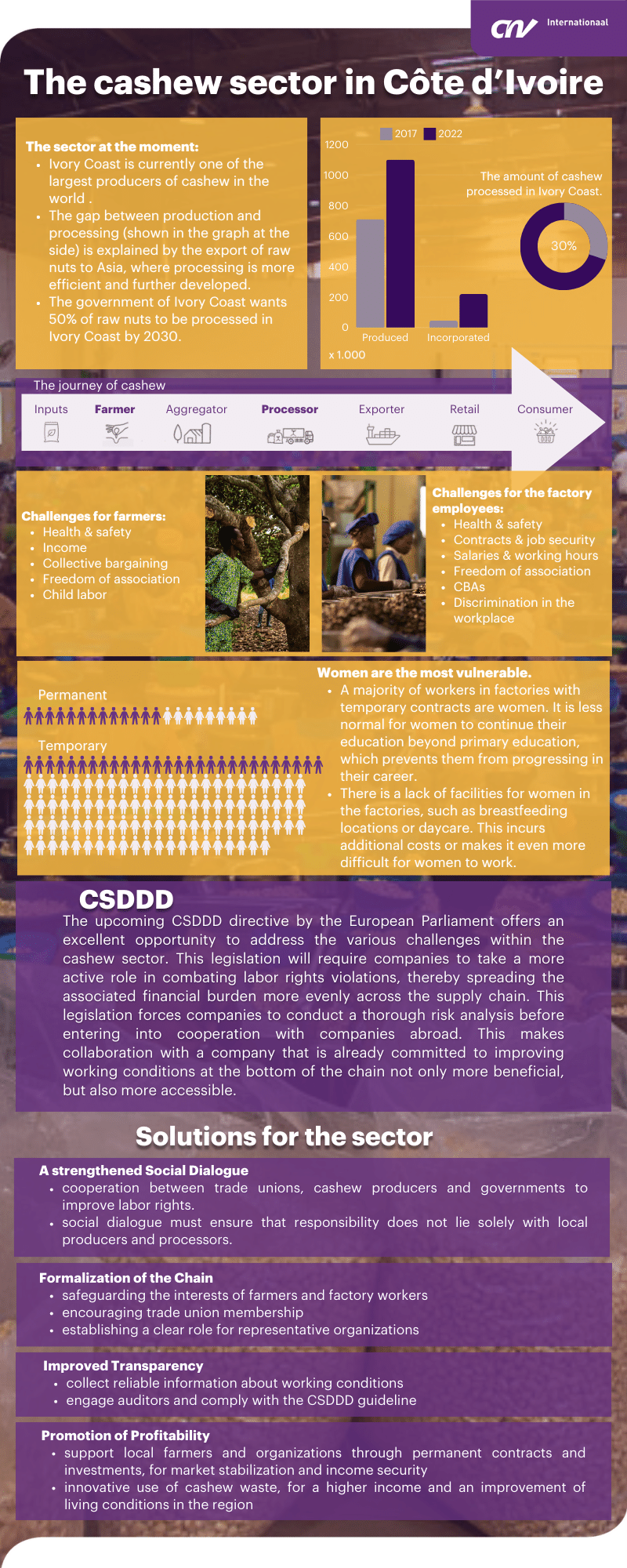Towards fair work for cashew workers
The cashew nut, the iconic fruit of the cashew tree, plays a key role in the economies of many West African countries, such as Benin, Senegal, and Ivory Coast. Despite the importance of this crop, most of the harvested nuts are exported to Asia and Europe for processing, leaving a small portion of the added value in Africa.
At the heart of this global supply chain, thousands of workers, often in vulnerable positions, face significant challenges related to working conditions, safety, and job insecurity. This page explores these issues, as well as the efforts led by CNV Internationaal and its partners to improve the living and working conditions in the sector.
Navigate through this content to better understand the ongoing initiatives and the development prospects for a more equitable, sustainable, and inclusive cashew supply chain. To navigate quickly, use the yellow index on the right

Both harvesting and processing cashew nuts is labour-intensive. Much of the work is done by women. They remove the pericarp, which contains a toxic substance that can cause severe skin irritations.
A Global Cashew Supply Chain Connecting Africa, Asia, and Europe
From this crop, a supply chain has developed that connects Africa, Asia, and Europe. The key actors in this chain include farmers or cooperatives, buyers, processors, and exporters.
Working Conditions for Cashew Workers
Cashew nut processing is demanding and requires protective equipment and safety measures, which are often inadequately implemented due to limited labor inspection. The most exposed are female workers, who hold vulnerable positions and are employed in collecting nuts on farms and in processing industries under precarious contracts.
The importance of the sector
The significance of the cashew supply chain is widely recognized. It provides jobs and foreign currency to many producing countries and contributes to value creation through artisanal and industrial processing. To capitalize on this, countries like Benin and Ivory Coast are focusing on increasing the amount of cashews processed locally.
Government Regulation
Cashew harvesting is primarily informal, carried out by small producers. The government sets cashew prices, but the supply is lower than the cumulative demand from foreign and local companies. this creates tension between external and internal demand.
Understanding the Sector’s Current State
The cashew sector faces a range of intertwined challenges, such as:
- Employment opportunities for youth and women
- Value addition through local processing
- Health and safety in the workplace
- Decent work conditions
- Environmental and social sustainability
- The informal nature of most work
- Rural community involvement
These challenges make the relationship between stakeholders crucial for the sector’s development.
In this context, CNV Internationaal commissioned a study of the cashew sector in Côte d'Ivoire to better understand these dynamics.
The cashewsector in Côte d'Ivoire
Challenges and solutions to improve working conditions
The cashew sector in Côte d'Ivoire, one of the world's largest producers, is facing urgent challenges that require attention. The rapid growth of the cashew market in Côte d'Ivoire (West-Africa) has led to a worrying pattern of informal employment and unstable incomes for farmers and factory workers. Farmers are paid based on production, leading to financial insecurity and inadequate income. On the other hand, workers in processing factories are usually hired by subcontractors, making them vulnerable to dismissal without the protection of labour laws.
Brief overview of the sector

Cashew research in view of CSDDD
Commissioned by CNV Internationaal, Fair Match Support investigated and mapped working conditions in the cashew sector in Côte d'Ivoire, especially in view of the new European CSDD legislation:

Research (download PDF)
Looking for synergies
Understanding the current situation of labour rights in the cashew sector in Côte d’Ivoire
Also available in French:
A la recherche de synergies>
Solutions for the cashewsector
Based on this research, to address these problems in the cashew sector, several possible solutions are proposed:
- Stronger social dialogue: Trade unions, cashew nut producers and governments need to come together to make a joint effort to improve workers' conditions. This social dialogue will ensure that local producers and cashew processors do not bear sole responsibility for working conditions through certifications and standards. The position of the workers in the processing factories should also be represented in this social dialogue, which is not the case at the moment.
- Improving transparency on working conditions: The sector urgently needs more transparency to gather reliable information on working conditions. By promoting internal dialogue with workers and transparency from producers, we can work towards improvements.
- Better formalisation of the chain: This includes promoting trade union membership, protecting the interests of farmers and factory workers, and establishing a clear role for the organisations that represent them.
- Promoting profitability: To ensure market stability, local farmers and their organisation need to be supported through permanent contracts and investment. This will not only increase their income security, but also improve the living conditions of the entire region through the innovative use of cashew waste.
CNV Internationaal's committment
Opportunities through CSDDD
The EU's forthcoming CSDDD legislation provides a crucial opportunity to address these issues. It will encourage companies to take responsibility for working conditions throughout the supply chain. It is essential that organisations, governments and other stakeholders work together to address these challenges and ensure a sustainable future for the cashew sector in Côte d'Ivoire.
Thanks in part to funding from the Dutch Ministry of Foreign Affairs for the Combination countries, including Côte d'Ivoire, CNV Internationaal is able to contribute to the above improvements and to international responsible business practices in the cashew sector.
All actors in the supply chain are needed
All actors in the supply chain are needed to reduce and prevent labour rights abuses.
The costs of reducing and preventing labour rights abuses need to be factored into the entire supply chain, and the market should become 'preferential' to those who make improvements.
Fortunately, many actors are already working on this, so there are potential partnerships to be found. It is important to maintain a broad focus, as social sustainability is not an isolated issue, but part of the wider sustainability challenge, which includes an environmental and economic perspective. Overall, the sector is moving forward and seizing opportunities to comply with the new EU regulations.
The commitment of CNV Internationaal
Towards a fairer and more inclusive Cashew Supply Chain in Côte d'Ivoire
In Côte d'Ivoire, CNV Internationaal supports its partner, CISL Dignité, in fostering an inclusive approach that has mobilized key stakeholders, including the Ivorian employers’ organization, trade unions, and the Cashew Interprofessional Agricultural Organization. Based on the study’s findings, they have developed a theory of change and action lines aimed at making the supply chain more inclusive and fair, in line with the CSDDD.
Challenges and solutions in Benin
CNV Internationaal, alongside its partners in Africa, is working to improve conditions for cashew workers. In Benin, CNV Internationaal collaborates with the Confederation of Independent Trade Unions (COSI-Benin). Initial efforts included advocating for better safety equipment and increased productivity for workers, followed by training on organizing to defend their rights, especially the right to collective bargaining (ILO Conventions 87 and 98).
COSI Benin’s involvement also addresses access to universal health insurance and gender-based violence in the workplace. Through lobbying and advocacy, With support of CNV Internationaal COSI Benin has initiated promising dialogues with companies like FLUDOR S.A., aimed at improving the working conditions of thousands of cashew and shea workers.
Improving labour inspection in agriculture
Work in agriculture is hard and often too little is done to protect farm workers from dangerous substances in plant protection products. Labour inspectorates take too little action against abuses.
Trade union COSI stands up for the interests of agricultural workers and is pushing for the ratification of ILO Convention 129 on labour inspection in the agricultural sector.
Unfortunately, ratification is not yet a reality. However, partly thanks to the efforts of trade union COSI, the necessary preparations are now being made, as this video shows.
Trade unions and also employers' organisations are guiding this process. That is a good lesson. I hope this will happen more often.
Raymond Zounmatoun,
Director of labour standards,
Directorate-General for Employment, Benin
Contact us
The cashew sector in West Africa, while full of potential, faces significant challenges.
Efforts from organizations like CNV Internationaal are vital to ensuring a fair, sustainable, and inclusive supply chain that benefits all workers, especially the most vulnerable.
Contact us if you want more information
Francisca van Dusseldorp, coordinator Africa CNV Internationaal
f.vandusseldorp@cnv.nl
Latifou Yessoufou, coordinator CNV Africa office, l.yessoufou@cnv.nl